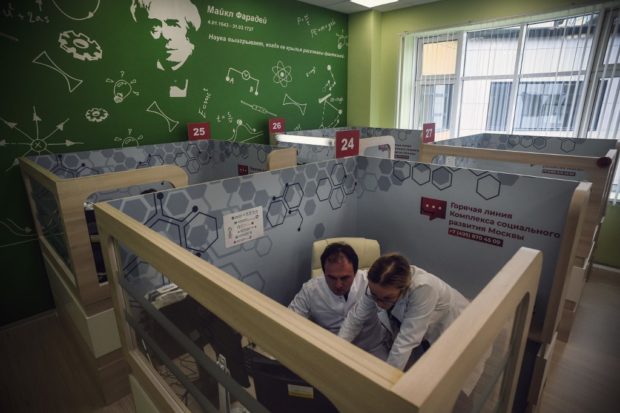Amid pandemic, a turning point for telemedicine

Doctors speak with patients during online consultation sessions at a telemedicine centre in Moscow on April 7, 2020. AFP
WASHINGTON — For a follow-up visit after her recent cancer surgery, Gail Rae-Garwood opted for a video consultation with her specialist, avoiding a long journey — and potential exposure to COVID-19 in medical offices.
“I am so thankful not to have to go out that I’ve enrolled my grumpy husband into tele-visits, too,” said the 73-year-old Arizona woman who was able to upload data from a blood pressure cuff and glucose monitor to her physician.
The coronavirus outbreak has severely strained the health system, but telemedicine is being seen as a vital way of coping including for those impacted by the outbreak.
“COVID-19 is very conducive to telemedicine,” said Omar Khan, a family physician and head of Delaware Health Sciences Alliance in Wilmington, Delaware.
Khan said doctors can make a preliminary diagnosis by evaluating symptoms such as fever and cough, and the patient’s travel and contact with others.
A lab order to confirm an infection can be transmitted electronically to minimize contact.
“Eighty percent of people with coronavirus don’t need to go to the hospital,” Khan said. If an infection is detected, “they move from quarantine to isolation” and many still don’t need to leave home.
Khan said he has been handling all his consultations remotely for the past two weeks, and that patients are handling the shift well.
“They know the danger,” he said. “They don’t want to put themselves or health care workers at risk, and don’t want to come to the hospital unnecessarily. At a time like this a hospital is a scary place.”
Highlighting value
The crisis has highlighted the value of telemedicine, long touted as a way to deliver medical care to people in underserved areas and to deal more efficiently with issues ranging from minor emergencies to mental health.
“A crisis sometimes ends up giving you an incentive to change things,” said Preeti Malani, a University of Michigan professor of medicine who led a 2019 survey of telemedicine for older adults.
A year ago, Malani said, the survey showed many older adults had little knowledge or interest in telemedicine, but the situation has now changed dramatically.
“In a matter of days we’ve completely switched and particularly older adults who may be vulnerable to complications are being told not to come to clinic,” said Malani.
Easing of regulations
With the virus raging, regulatory barriers to telehealth services have quickly come down.
US authorities last month waived restrictions that had prevented telemedicine for government-sponsored Medicare and Medicaid and a rescue package passed by Congress included some $200 million to help providers establish remote care.
Many US states have lifted restrictions and insurance companies have waived co-payments for these consultations.
Privacy regulations which limited the kinds of technology for video consultations have also been eased, making it possible to use consumer-friendly services like Skype or FaceTime.
“I’ve been pleasantly shocked to see (regulatory moves) which would have taken five to 10 years,” said Courtney Joslin, a researcher following regulatory issues with the R Street Institute, a public policy think tank.
“We’re going to come out of this with a lot of evidence on how well telehealth works.”
Insurance on board
Gary Berman, a New Jersey cardiologist, began remote consultations as part of an effort to protect his practice and his patients during the outbreak.
Berman would have offered telehealth consultations before, but until last month the visits were not covered by private or government insurance, or by his own malpractice coverage.
“I’ve been interested in telemedicine for a long time, but I didn’t want to expose myself to legal risks and not get reimbursed,” he said.
The physician said he may continue offering remote consultations if insurance coverage is extended.
“There are some things you can’t do — you can’t reliably take someone’s blood pressure, you can’t hear a heart murmur,” he said. “But I would continue for some people. I have 90-year-old patients who can’t get to the office.”
Shaping the future
Joe Kvedar, president-elect of the American Telemedicine Association, said the pandemic is likely to help shed light on the kinds of services that need to be in person versus those handled remotely.
Many urgent care needs, mental health, post-operative follow-ups and diabetes management are among the areas that are handled easily by telemedicine, he said.
Telemedicine is becoming easier with devices such as internet-connected thermometers, pulse oximeters and other technology to monitor vital signs.
“Up until this crisis the only service delivery option was to come to the office,” Kvedar said.
“I don’t think we’ll go back to that system. After this is over, there will be tapestry of options that are high quality and convenient.”
For more news about the novel coronavirus click here.
What you need to know about Coronavirus.
For more information on COVID-19, call the DOH Hotline: (02) 86517800 local 1149/1150.
The Inquirer Foundation supports our healthcare frontliners and is still accepting cash donations to be deposited at Banco de Oro (BDO) current account #007960018860 or donate through PayMaya using this link.